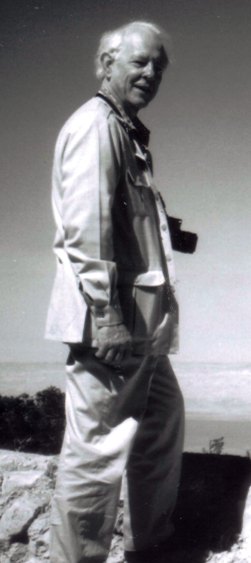 Hydrogeologist and Assistant Director of the Geological Survey, who headed its Geophysics and Hydrogeology Division.
Hydrogeologist and Assistant Director of the Geological Survey, who headed its Geophysics and Hydrogeology Division.
David Gray, a Fellow for 64 years, died 18 March 2013. Born at Chelmsford, in Essex, on 4 September 1925, he went to school in Colchester and Brentwood before joining the Royal Naval Volunteer Reserve in 1943. Commissioned as midshipman, he served in motor torpedo boats in UK waters as well as spending a year in West Africa, contracting malaria, which was to affect him periodically throughout his life.
Following demobilisation, and a geology degree at University College London, he joined the Geological Survey, beginning his career mapping in Kent. Preferring more applied work, he requested a transfer to the Water Department where he spent the next 24 years. He joined as interest in groundwater was beginning to blossom, dealing with enquiries and work associated with the implementation of the 1945 Water Act. He also carried out the first systematic investigations of saline intrusion into coastal aquifers in the UK and began to apply geophysical methods to hydrogeological problems
In 1965 seven staff from the Water Department were transferred to the newly formed Water Resources Board. Those remaining formed the core of a new Hydrogeological Department and David was appointed Chief Hydrogeologist. His remit was to convert the Department from a service to a research organisation and to provide hydrogeological support to the Overseas Division of the newly named Institute of Geological Sciences. He was a progressive manager at a time when management in some parts of the organisation stifled innovation. By the time he left the Department, it had been entirely reborn as a centre for applied hydrogeological research, with an international reputation.
Promoted an Assistant Director in 1974, initially in charge of the Special Services Division, three years later he was happy to take charge of a new Geophysics and Hydrogeology Division where there was a large component of commissioned and fundamental research. Here he played a major role in the setting up of task forces to look at the potential of geothermal energy in the UK and the disposal of radioactive wastes. These were new, politically sensitive fields of research, and his personal commitment was instrumental to their success. Those who worked with him will remember a determined and committed professional who never lost his interest in science and gave his staff outstanding support. The award of a CBE in the 1986 New Year’s Honours crowned his career. Retiring in 1985, he advised civil engineers on water-inflow problems associated with tunnelling and the European Community on their Geothermal Programme.
During his time as a naval officer in north Kent he met and subsequently married a young actress, Bunty Leaton. The union between the rather reserved David and the vivacious Bunty was predicted to be a short one by many colleagues, but endured happily for over 50 years until her death in 2006. They made their home in Harrow where their two sons, Richard and James were born. Although joints were beginning to wear out, he was active until the end, and his death was sudden and unexpected.
Written by John Mather